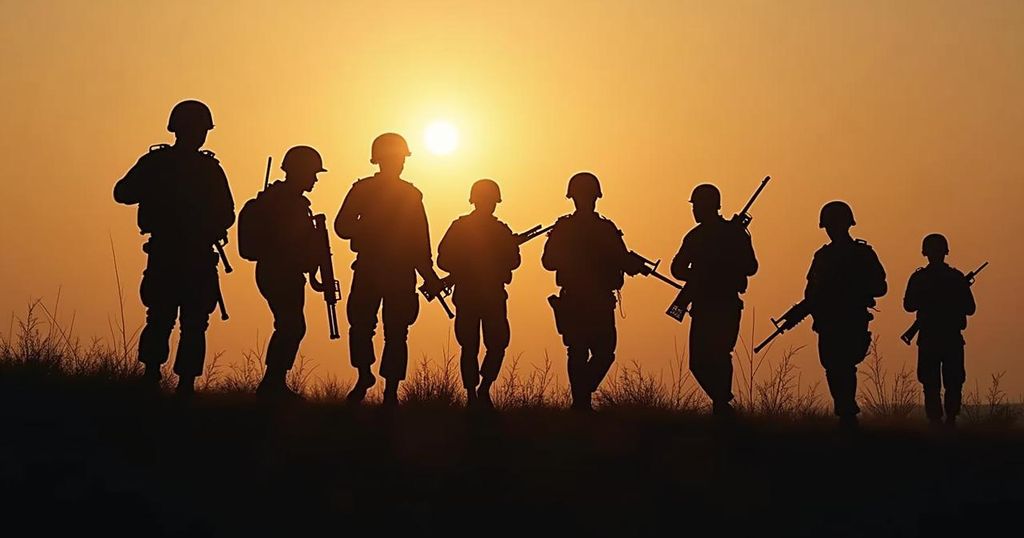Human Rights Watch has reported substantial civilian atrocities amid ongoing military confrontations between Rwandan forces and the M23 rebel group in the DRC. The M23, supported by Rwanda, is accused of widespread violence, including forced recruitment of child soldiers and sexual assaults. Displacement camps in North Kivu are particularly impacted, and HRW urges both Congolese and Rwandan authorities to investigate these violations and provide humanitarian assistance to victims.
On Thursday, Human Rights Watch (HRW) published a comprehensive report detailing alarming civilian atrocities occurring in the eastern Democratic Republic of the Congo (DRC) amid intense military confrontations involving Rwandan armed forces and the M23 rebel group. As these military forces advance towards the town of Sake, local residents and over half a million displaced individuals face an escalating threat of violence and humanitarian crises. The M23, a Tutsi-led armed faction supported by Rwanda, has been engaged in an insurgency since its resurgence in 2021. Numerous allegations have emerged against the group for committing egregious atrocities against civilians, including indiscriminate attacks, sexual violence, and the forced recruitment of child soldiers. The situation has been exacerbated by Rwanda’s purported backing of the M23, notwithstanding the ongoing international calls for peace and stability. Displacement camps in North Kivu, particularly near Goma, have evolved into hotspots of violence amid the conflict. One particularly impacted site is the Shabindu-Kashaka displacement camp, which faced devastating rocket attacks in early April from Rwandan military forces and the M23, resulting in the death of a 19-year-old and substantial shelter destruction. Furthermore, on May 3, additional rocket strikes targeted Lac Vert and Mugunga neighborhoods, leading to the tragic loss of at least 17 civilian lives, including the lives of 15 children. The report by HRW highlights dire humanitarian conditions in the Kanyaruchinya camp, where evidence suggests unlawful detentions carried out by Wazalendo fighters who extort money and valuables from the detained individuals. Victims have reported being held in makeshift areas referred to as “kiboro.” Survivors have recounted instances of violence and mistreatment. Of particular concern is the alarming trend of sexual violence reported frequently, with numerous survivors mentioning that their assailants often wore military uniforms. The report suggests that these heinous acts occur at an alarming rate, with reports indicating between 50 to 100 cases of sexual violence each week within certain camps, underscoring an urgent requirement for protective measures. The actions detailed in HRW’s report may constitute significant violations of international humanitarian law, particularly the Fourth Geneva Convention, which is designed to protect civilian populations during armed conflicts. Unlawful detentions and extortions could also be classified as war crimes under the auspices of the Rome Statute of the International Criminal Court. HRW has strongly urged the Congolese and Rwandan authorities to thoroughly investigate and hold accountable those responsible for war crimes, with particular emphasis on crimes pertaining to sexual violence, in accordance with the principle of command responsibility. The organization advocates for comprehensive humanitarian assistance to all at-risk civilians, which includes essential legal, social, and medical support for survivors of sexual violence. Additionally, HRW calls upon both governments to endorse the 2022 Political Declaration on Strengthening the Protection of Civilians from the Humanitarian Consequences Arising from the Use of Explosive Weapons in Populated Areas. Lastly, the organization stresses the significance of oversight by the UN, EU, and other international entities to monitor military assistance provided to both parties involved, ensuring that such assistance does not contribute to further abuses and that human rights standards are consistently upheld.
The Democratic Republic of the Congo has been troubled by armed conflict for decades, with various militia groups vying for power and control, leading to massive displacement and humanitarian crises. The M23 rebel group, gaining notoriety for its ties to Rwanda, emerged prominently after a resurgence in insurgency since 2021. The involvement of Rwandan forces has further complicated the situation, prompting calls from the international community for accountability and an end to the cycle of violence. Human Rights Watch, an esteemed organization advocating for human rights, regularly reports on violations and atrocities in conflict zones, making their findings crucial for understanding and addressing the ongoing crisis in the DRC.
The report published by Human Rights Watch sheds light on the grievous situation faced by civilians in the eastern Democratic Republic of the Congo due to the actions of Rwandan forces and the M23 rebel group. The ongoing violence, including extensive civilian casualties, sexual violence, and unlawful detentions, points to severe violations of international humanitarian law. Urgent action is needed from both Congolese and Rwandan authorities to investigate these crimes and provide necessary support to the affected populations. A coordinated international response is essential to uphold human rights standards and protect vulnerable civilians from further harm.
Original Source: www.jurist.org







